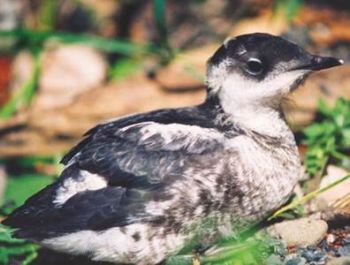
Publisher:
Bonnie King
CONTACT:
Newsroom@Salem-news.com
Advertising:
Adsales@Salem-news.com

~Truth~
~Justice~
~Peace~
TJP
May-13-2013 22:58

 TweetFollow @OregonNews
TweetFollow @OregonNews
Conservation Groups Call for Increased Protections for Rapidly Declining Seabird
Salem-News.comMurrelet habitat on state and private lands continues to be lost to logging.
 Marbled Murrelet photo: ABC Birds |
(WASHINGTON DC) - In a letter sent today, over 100 conservation and scientific organizations are calling on the Obama administration to provide new protective measures for the Marbled Murrelet, a federally listed bird species whose population is rapidly declining.
The letter asserts that the “accelerated decline of this species is an indication that current protections for its old-growth forest habitat need to be augmented, benefitting clean air, clean water, wild salmon runs, carbon sequestration, and other ecosystem services uniquely provided by these irreplaceable forests.”
A recent peer-reviewed study by the U.S. Fish and Wildlife Service and U.S.D.A. Forest Service found that the Marbled Murrelet’s population in California, Oregon, and Washington State had declined by 29 percent over the last decade. This trend is consistent with the government’s 2009 five-year status review of the species, which concluded the population could be extinct outside of the Puget Sound area within 100 years.
“More needs to be done. These findings indicate that current efforts to eliminate threats and protect habitat are not enough to bring this species back,” said Steve Holmer, senior policy advisor for American Bird Conservancy, a leading bird conservation group. “Additional habitat protection, acquisition of new forest reserves, and improved recreation management offer hope for its eventual recovery.”
Murrelet habitat on state and private lands continues to be lost to logging. One study (Falxa et al) documented a 30 percent loss of murrelet habitat on nonfederal lands within the tri-state range between 1996 and 2006. That same study recognized timber harvest as the primary cause of habitat loss on nonfederal lands.
Proposed changes to the Northwest Forest Plan have also left the species’ habitat more vulnerable to disturbance. The final 2012 Northern Spotted Owl critical habitat rule encourages logging in owl-critical habitat, which, in part, overlaps with that of the murrelet. Agency analysis included in the owl rule’s draft environmental assessment indicates that such management practices would likely be harmful to the Marbled Murrelet. Logging—both clearcutting and commercial thinning—increases fragmentation, opening the forests to nest predators such as crows, ravens, and jays.
“To conserve the murrelet, a plan is needed that will protect the remaining habitat and prevent fragmentation in nearby forests to minimize predation and nest disturbance,” said Holmer. “These steps would offer hope for the Marbled Murrelet, and help to preserve an ancient forest legacy for the benefit and enjoyment of current and future generations of Americans.”
#
American Bird Conservancy (ABC) is a 501(c)(3) not-for-profit membership organization whose mission is to conserve native birds and their habitats throughout the Americas. ABC acts by safeguarding the rarest species, conserving and restoring habitats, and reducing threats, while building capacity in the bird conservation movement.
 |
 |
 |
Articles for May 12, 2013 | Articles for May 13, 2013 | Articles for May 14, 2013

Salem-News.com:


Quick Links
DINING
Willamette UniversityGoudy Commons Cafe
Dine on the Queen
Willamette Queen Sternwheeler
MUST SEE SALEM
Oregon Capitol ToursCapitol History Gateway
Willamette River Ride
Willamette Queen Sternwheeler
Historic Home Tours:
Deepwood Museum
The Bush House
Gaiety Hollow Garden
AUCTIONS - APPRAISALS
Auction Masters & AppraisalsCONSTRUCTION SERVICES
Roofing and ContractingSheridan, Ore.
ONLINE SHOPPING
Special Occasion DressesAdvertise with Salem-News
Contact:AdSales@Salem-News.com

Terms of Service | Privacy Policy
All comments and messages are approved by people and self promotional links or unacceptable comments are denied.
[Return to Top]
©2026 Salem-News.com. All opinions expressed in this article are those of the author and do not necessarily reflect those of Salem-News.com.